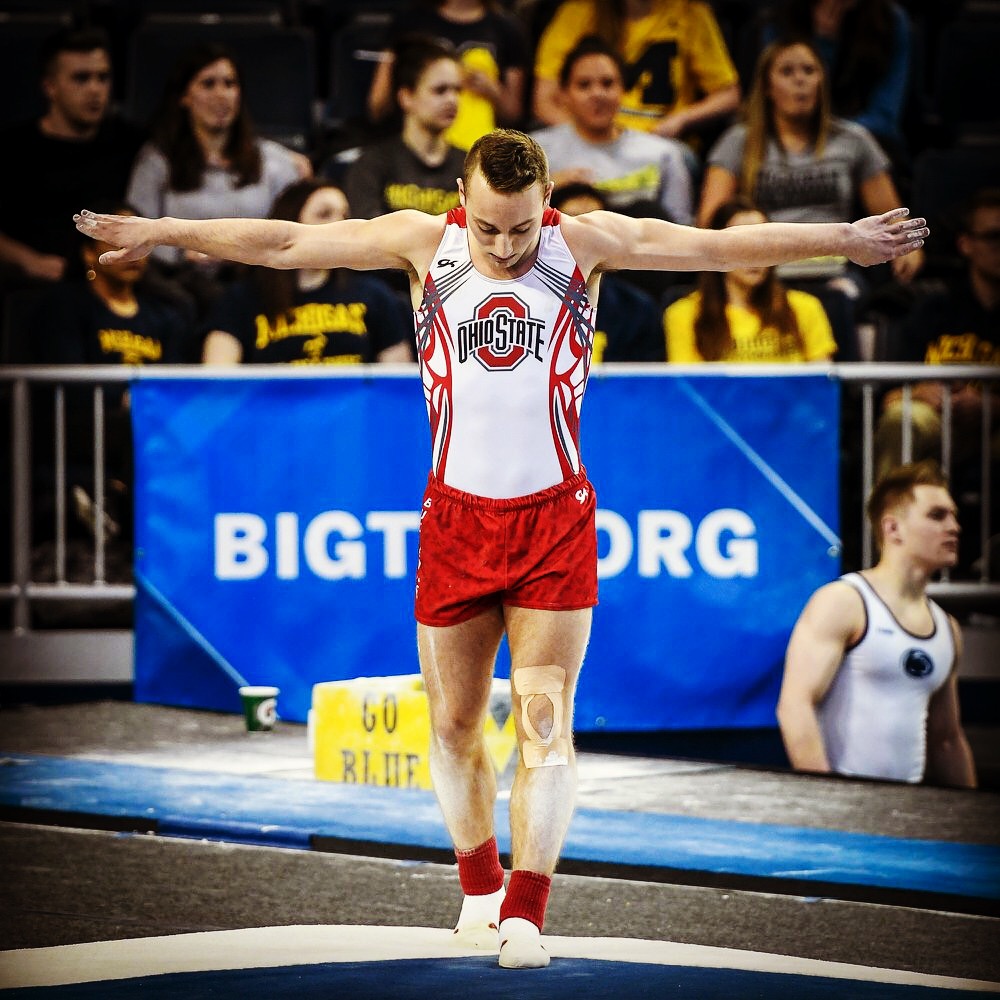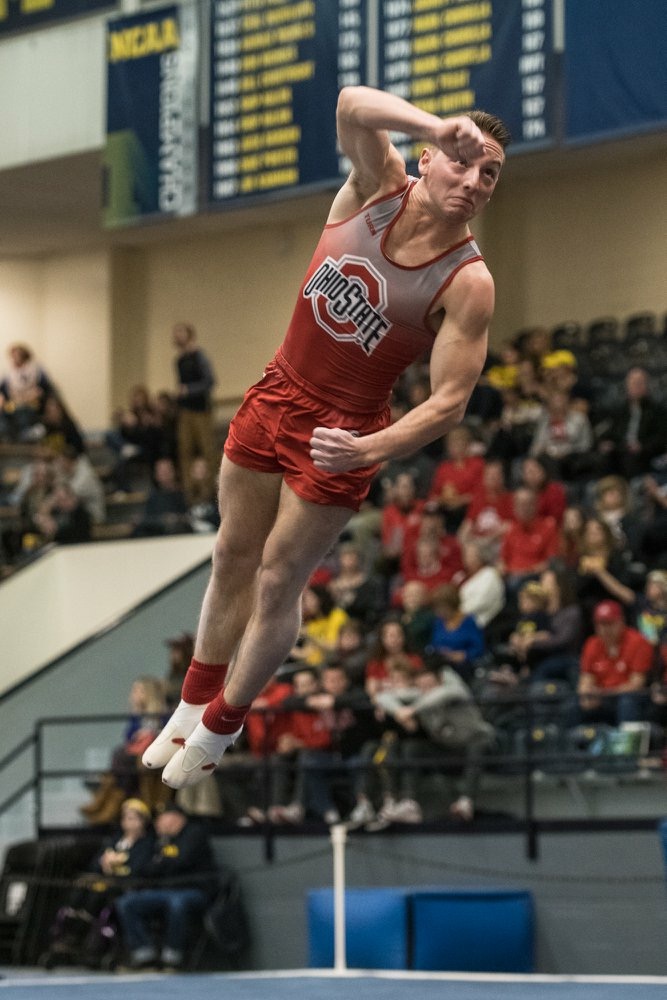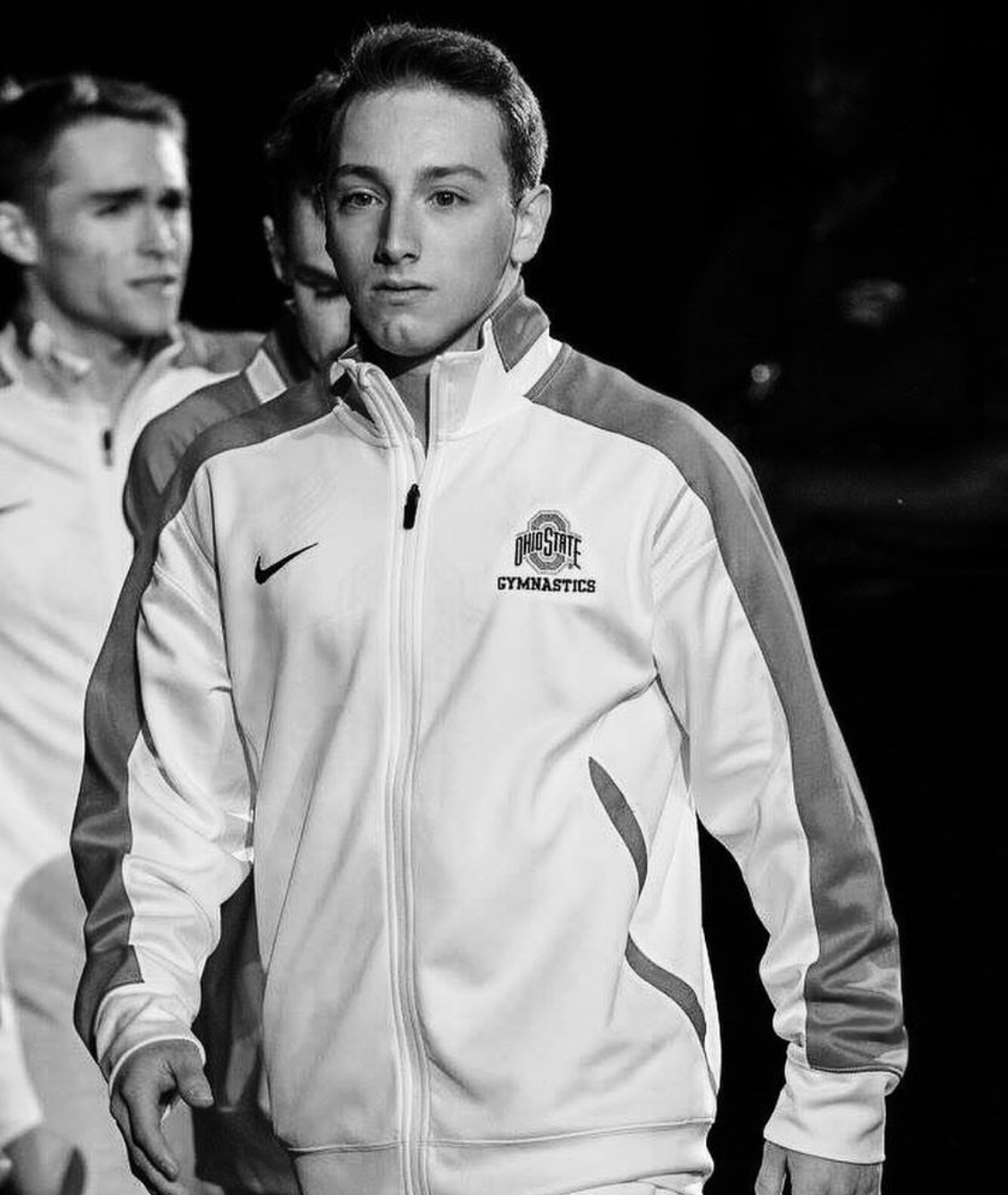Meet Joey Bonanno: Out and Proud Ohio State All-American Gymnast

By Joey Bonanno
When you envision a top athlete, the descriptive words that might come to mind include strength, power, masculinity and grit. Every young athlete aspires to have these qualities. But when you’re plagued with stereotypes and stigmas of what it means to be gay, many young athletes become scared to be who they are, to follow their dream. I believe the fear of non-acceptance from one’s family and team; along with the desire to protect the reputation of one’s sport is a driving force behind the hesitance of gay athletes to come out.
I remember the day I asked my mom to sign me up for gymnastics. I was doing cartwheels and running around my mom’s dance studio. I had an obsession with backflips and was determined to learn one. Little did I know my desire to learn a backflip would soon turn into so much more. It soon became my life, my passion and the essence of who I am today. I come from a family of four, born and raised in Fitchburg, Massachusetts. I was blessed with incredible parents, my mother, a dance studio owner and my father, a musician. With the influence of an artistic family, the value of passion was always in my blood. Growing up in one of the most difficult sports you could do, along with a rigorous training schedule was hard enough on its own. Feeling different and ashamed of who I truly was made it ten times more difficult. My high school life was consumed by gymnastics– and I had little understanding of who I was at my core outside of sport.
When I came to terms with my sexuality, I suppressed my soul with all my might. I put every ounce of my energy into gymnastics — into achieving perfection in all areas of my life. I did everything in my power to try and change who I was. Growing up in gymnastics, people were always protective of the masculinity of the sport. I always feared if I were to be out, I would ruin the reputation of Men’s gymnastics. I remember thinking “why me”, and that being gay was something that took away value from my life and something I had to compensate for. I remember many instances during my junior and senior year of high school, driving home after a late practice feeling a deep-set emptiness. I struggled to see how my life could get better, or how someone like me could be accepted and someday live a life of happiness. Before I saw being gay as my gift, it first seemed like a monstrous burden.
 College gymnastics was always my childhood dream. The vision that one day I might compete for a division one school is what woke me up in the morning and allowed me to push forward; it gave me purpose on my darkest days. After my very first visit to Ohio State, my heart was set. For the first time in my life, I saw an openly gay athlete on the team. I saw how valuable he was not only for his gymnastics, but for who he was as a person. I saw someone like myself who accomplished what I aimed to accomplish, and this was huge for me. My freshman year of college I was incredibly tough on myself. Not only did I feel I had to prove my value on the team as a walk-on athlete, but I also felt I had to compensate for my worth with perfectionism in school. That year, I put all my focus into school and gymnastics and worked my heart out. I pushed the fact that I was gay to the back of my mind and distracted myself with hard work. By the middle of the season during my sophomore year I hit my rock bottom and depression consumed me. I was stressed beyond belief with school, I was struggling to make lineup and hit my routines and on top of it all, I felt worthless at my core.
College gymnastics was always my childhood dream. The vision that one day I might compete for a division one school is what woke me up in the morning and allowed me to push forward; it gave me purpose on my darkest days. After my very first visit to Ohio State, my heart was set. For the first time in my life, I saw an openly gay athlete on the team. I saw how valuable he was not only for his gymnastics, but for who he was as a person. I saw someone like myself who accomplished what I aimed to accomplish, and this was huge for me. My freshman year of college I was incredibly tough on myself. Not only did I feel I had to prove my value on the team as a walk-on athlete, but I also felt I had to compensate for my worth with perfectionism in school. That year, I put all my focus into school and gymnastics and worked my heart out. I pushed the fact that I was gay to the back of my mind and distracted myself with hard work. By the middle of the season during my sophomore year I hit my rock bottom and depression consumed me. I was stressed beyond belief with school, I was struggling to make lineup and hit my routines and on top of it all, I felt worthless at my core.
I remember the next competition at Penn State I had an epiphany. I realized I’ve been through enough pain, enough suffering and it was time to own myself and take control of my life. I put this same energy into my gymnastics and I quickly transformed. I realized my worth and set myself free from the hatred I felt for myself my whole life. I validated that my pain was real and that I deserve success. My gymnastics gradually became more aggressive, as if I was taking what I deserved. My season started to improve, and I found myself on the floor and vault lineup for the 2017 NCAA championships. I remember walking around the arena at championships, taking in the experience and flourishing in the thought that I got there by being myself. On the day of team finals, I relied on nothing but my training and the power of my authenticity. I walked into the packed arena repeating in my head over and over again, “I’m Joey Bonanno, I’m gay and I’m worthy”. Over and over I repeated this mantra in my head, cathartically releasing any negativity or hesitance in my mind. It was almost my turn to start off the floor rotation and I walked up on to the podium, exploding with confidence. I remember rapping a Nicki Minaj verse in my head as hard as I could, blocking out any creeping doubt. The next thing I knew, I nailed the most incredible routine of my life. Not only did I leave that arena realizing the power my authenticity had, but also as an NCAA All-American on floor and second place runner-up with my team. I hope this shows the power of authenticity. I realized being gay is something I’m incredibly proud of. It’s what makes me unique and allows me to standout from others. Through relentless ownership of who I was, my confidence took off and my athletic ability soared. By realizing my inherited worth, I was able to draw confidence from my truth and perform with no chains holding me back.
I’m so grateful to have joined a team that had exposure to gay athletes before me. These individuals along with incredible team captains who are allies all worked hard to create a zero tolerance environment for homophobia. However, not all teams in the NCAA are like this. It’s the small, homophobic comments that add up in a team environment that amplifies the notion that being gay makes you less and that being gay is correlated to weakness. This is what needs to end. It’s okay to have a sexual orientation that is not the norm and still be tough as hell and one of the top athletes in the United States. In order to break these stereotypes, we need to create a culture, which will allow more athletes to stand out and show themselves authentically. Most importantly, we need to stop using derogatory homophobic slang in our sports culture to describe weakness. There is most likely an abundance of closeted athletes being held back by fear to be authentic and we need more visibility of NCAA athletes to help change this culture of sport.
 We also need NCAA schools to adopt LGBTQ-inclusive policies and practices. Having these policies sends a clear signal to LGBTQ athletes that they are welcomed and accepted. Seeing individuals similar to me pursuing the most elite level of their sport is what allowed me to find my own identity and accept myself. For instance, LA galaxy soccer player Robbie Rogers shared his story in his book, which helped me so much on my own personal journey. USA national team gymnast Josh Dixon paved the way for acceptance in men’s gymnastics as one of the only openly gay gymnasts at his level. Most importantly, my own teammate and Big Ten Champion, Jake Martin helped to transform the team culture at Ohio State and promote an environment of acceptance and respect. These are the figures I will forever be thankful for due to their visibility and the path they led to make things easier for individuals like myself. I’m incredibly grateful for the acceptance I received from my parents and sister to be authentically myself. Their support allowed me to release the burden holding me back from reaching my true potential. I am also grateful for my teammates and coaches for helping to cultivate an environment of acceptance at Ohio State.
We also need NCAA schools to adopt LGBTQ-inclusive policies and practices. Having these policies sends a clear signal to LGBTQ athletes that they are welcomed and accepted. Seeing individuals similar to me pursuing the most elite level of their sport is what allowed me to find my own identity and accept myself. For instance, LA galaxy soccer player Robbie Rogers shared his story in his book, which helped me so much on my own personal journey. USA national team gymnast Josh Dixon paved the way for acceptance in men’s gymnastics as one of the only openly gay gymnasts at his level. Most importantly, my own teammate and Big Ten Champion, Jake Martin helped to transform the team culture at Ohio State and promote an environment of acceptance and respect. These are the figures I will forever be thankful for due to their visibility and the path they led to make things easier for individuals like myself. I’m incredibly grateful for the acceptance I received from my parents and sister to be authentically myself. Their support allowed me to release the burden holding me back from reaching my true potential. I am also grateful for my teammates and coaches for helping to cultivate an environment of acceptance at Ohio State.
For anyone or any athlete who may be struggling with the thought of coming out or self-acceptance, no matter what, you are worthy and you are valuable. Your sexuality does not define who you are and one day you will realize it’s a gift and not a curse. Surround yourself with people who love you for who you are and stand up against injustice and homophobia. For individuals who are members of a team, be mindful of the language you use and what it’s promoting. When entering your athletic facility, leave any negative values you may have at the door and unite as one with your team to reach the highest level of team success. Stand up against homophobic culture and be the reason why someone feels comfortable in his or her sport.
Thank you.
– Joey
You can find Joey on Instagram at @JoeyBonanno